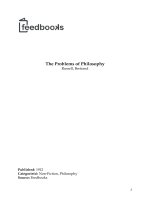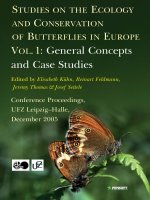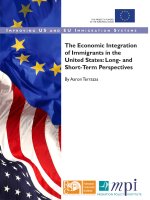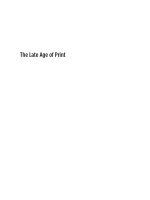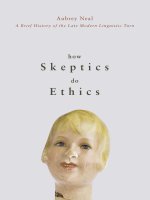The problems of confucianism in the late warring states period and xunzis reconstruction of confucianism
Bạn đang xem bản rút gọn của tài liệu. Xem và tải ngay bản đầy đủ của tài liệu tại đây (660.07 KB, 147 trang )
THE PROBLEMS OF CONFUCIANISM IN THE LATE
WARRING STATES PERIOD AND XUNZI’S
RECONSTRUCTION OF CONFUCIANISM
SUN WEI
(MA, Renmin University of China)
(BA, Shandong University)
A THESIS SUBMITTED
FOR THE DEGREE OF DOCTOR OF PHILOSOPHY
DEPARTMENT OF PHILOSOPHY
NATIONAL UNIVERSITY OF SINGAPORE
2007
ii
Acknowledgements
I have accumulated many debts to people who have kindly offered advice and
assistance over the years in pursuing my Ph.D. degree.
I am especially grateful to my supervisor, Assoc. Prof. Tan Sor Hoon, who gave
me much-needed encouragement and guidance throughout the whole process of
research and writing. From her timely and detailed comments on my various drafts, I
learned what a Confucian teacher should do in teaching the students, that is, “to teach
without growing weary.” From her diligent attitude and hard working in the academic
research, I learned what a Confucian scholar should do in the academic research, that
is, “to learn without flagging.” It is from her that I know how to write a thesis
seriously and meticulously.
I am also indebted to Prof. Alan Chan, Assoc. Prof. Cecilia Lim, and Prof. Chong
Kim Chong, who gave me encouragement and suggestions for writing my thesis.
My fellow graduate students at the Department—Jude, Kim, Raphael, Wanquan
and Kok Tien—shared the happiness with me during the past four years.
I am also grateful to my parents for their support and encouragement of my
academic pursuits.
Finally, I dedicate this dissertation to Jing, my wife, without whom this and
much else would have been impossible.
iii
TABLE OF CONTENTS
ACKNOWLEDGEMENTS ⅱ
TABLE OF CONTENTS ⅲ
SUMMARY ⅳ
CHAPTER ONE: INTRODUCTION 1
What Will We Argue in This Thesis? 1
Debate on Xunzi’s Confucian Status 5
Who is a True Confucian? 11
Xunzi—the Confucian 16
Methodology of This Thesis 20
CHAPTER TWO: CONFUCIAN TEACHINGS ON ZHI 23
Learning (Xue 學) 24
Si (思) 40
Xu (Emptiness), Yi (Unity) and Jing (Stillness) in the Heart/Mind (Xin 心) 48
CHAPTER THREE: CONFUCIAN TEACHINGS OF HUMAN NATURE
(XING) 69
Confucian Moral Cultivation: The Role of Xing and Tian 70
Challenges to Confucius’ and Mencius’ Moral Concept of Tian 71
Xunzi’s Tian Lun: Departure from Confucius and Mencius 77
Xing is Good 86
Xing is Bad 90
CHAPTER FOUR: CONFUCIAN POLITICAL TEACHINGS 102
Good Government 103
Li and Fa as the Approaches for Achieving Good Government 112
Wang and Ba 125
Conclusion 135
BIBLIOGRAPHY 138
iv
Summary
This thesis aims to examine the problems Confucianism encountered in the late
Warring States period and how Xunzi solved these problems and reconstructed
Confucianism by incorporating other non-Confucian schools’ teachings.
This thesis examines the problems Confucianism encountered in terms of knowledge,
human nature and politics. In the aspect of knowledge, Confucius’ broad learning
became unbalanced and incomplete in Mencius’ teachings, which could not meet the
need of the time. In contrast, Xunzi argued for a broad learning and borrowed the
terms xu, yi and jing from Zhuangzi to reconstruct the Confucian teachings about
knowledge. In the aspect of human nature, Mencius’ view that human xing is good is
not plausible and could not provide a better basis for Confucian theory of moral
cultivation and good government. In contrast, Xunzi argued for the view that human
xing is bad and pointed out the way of cultivating bad human xing to be good. In the
aspect of politics, Mencius’ teachings could not provide an effective approach for
attaining the ideal of good government. In contrast, Xunzi argued for li associated
with fa, which might be borrowed from Shang Yang, as the way for achieving good
government. This thesis argues that Xunzi not only remained within the Confucian
tradition, but also improved former Confucians’ teachings to a great extent.
1
CHAPTER ONE
INTRODUCTION
What Will We Argue in This Thesis?
Xunzi, a great thinker living in the late Warring States period of ancient China,
received many criticisms from Chinese philosophers, including Confucian scholars.
Contrary to the various criticisms and suspicions of Xunzi’s Confucian identity, in this
dissertation, I will argue that Xunzi is a Confucian who not only adhered to the
teachings of Confucius, but also improved the Confucian teachings to a great extent.
Without the effort of Xunzi, it is hard to imagine that Confucianism could prevail over
other intellectual thoughts and flourish in later generations.
1
Basically, this dissertation will argue for the following theses:
1. Xunzi not only continued but improved Confucius’ teachings;
2. Xunzi improved Confucianism by incorporating the thought of other schools
of Chinese philosophy;
3. Xunzi incorporated the thought of other schools in order to strengthen
Confucianism theoretically and thereby make it more persuasive and practical
for his times in order to achieve the Confucian moral and political ideals more
effectively.
This dissertation will elucidate the above with a detailed philosophical study of the
text of Xunzi that compares it with other texts from the Warring States period. From
the detailed textual comparison between the Xunzi and other texts, we could see the
1
Confucianism, Taoism, Mohism and Legalism are the conventional English terms for the various schools of
thought in the East Zhou period, although the schools were so identified only from the Han Dynasty onwards.
2
similarities between Xunzi and these non-Confucians in terms of some important
issues and how non-Confucian teaching could be helpful in improving Confucianism
to be more adaptable to the time and in achieving Confucian moral and political
ideals.
As many commentators and thinkers have noticed, Xunzi not only inherited the
Confucian tradition, but also integrated other philosophical traditions, such as Taoism,
Mohism and Legalism, into his own philosophy. This may be the reason why Xunzi is
easily misunderstood to be a non-Confucian. However, in my view, Xunzi did not
become a non-Confucian just because of his incorporation of other schools’ teachings.
In fact, Xunzi’s incoroporation of these other schools’ teachings was for the purpose
of improving Confucianism. I shall examine in detail these other schools’ influences
on Xunzi and see how they improve Confucianism.
An interesting question emerges here: why did Xunzi integrate these other
thoughts from very different philosophical traditions, even traditions explicitly
opposed to Confucianism? If they are for the improvement of Confucianism, what are
the problems in Confucianism he intended them to solve? From the second to fourth
chapter, I will investigate and assess the nature of these problems and Xunzi’s
solutions. The problems of Confucian teachings include its theories of knowing,
human xing, and politics, to which most of its important teachings are related.
Confucianism is a practice-oriented school concerned with cultivating people to
be moral and formulating a good government and an orderly society. As various
sayings in the Analects indicate, it is important to apply one’s moral learning or
3
knowledge.
2
In this sense, its theories must be plausible enough to be put into
practice.
Confucian teachings of knowing encountered a series of problems in the late
Warring States period. For example, Mencius’ teachings of knowing premised on
good human xing (human nature) and focusing on moral relationships could not
secure a good socio-political order in a time of chaos and disorders, not to mention the
attainment of Confucian ideals. The frequent wars and miserable living conditions
made it especially hard for people to believe that human beings are good in nature, as
Mencius claimed. More importantly, it is really difficult to expect a person to cultivate
himself to be moral without any external compulsion. As to political teachings,
Mencius could not provide an effective approach to achieve a good government ruled
by a sage king in the late Warring States period. Thus, these problems reflect one
common problem: Confucianism has lost touch with the reality of the late Warring
States period. To improve Confucianism and achieve Confucian ideals, its theoretical
assumptions as well as arguments for moral cultivation and good government need to
be revised to be more realistic. Otherwise, Confucianism could not even survive, not
to mention flourish. In this dissertation, I will show how the need to revise and
improve Confucianism led Xunzi to integrate other schools’ teachings on knowledge,
human nature and politics into Confucian teachings.
The problems of Confucianism in the late Warring States period and the solutions
Xunzi provided are very important for scholarship since they touch on important
2
Refer to D. C. Lau, trans., The Analects (London: The Penguin Group, Penguin Books, 1979), 1.1, also 6.23.
4
questions in the history of Confucianism, with implications for contemporary
understanding of the tradition. An in-depth study of Xunzi’s improvement on
Confucianism would help us understand how the Confucian tradition evolved in its
long history to become a predominant intellectual tradition in ancient China. Xunzi’s
method of incorporating non-Confucian thought is one that has been repeatedly used
in a tradition that has weathered the changes of more than two millennia. Some
contemporary works on Xunzi have acknowledged that Xunzi incorporated some
non-Confucian teachings into his own teachings. However, the reason why Xunzi did
so is inadequately explained. Is it out of arbitrary personal preference? Or is it to
improve Confucian teachings? If it is to improve Confucian teachings, Confucian
teachings must have encountered some problems that need to be solved. If so, what
are these problems and what elicit or exacerbate these problems? Could Xunzi’s
strategy effectively and successfully solve these problems? These questions,
unfortunately, are not fully and effectively answered in current scholarship.
Xunzi’s stragtegy of solving the Confucian problems in the late Warring States
period, such as his emphasis of li and fa, provided an important pattern for modeling a
Confucian society in the contemporary world. Although the situation is different from
the time Xunzi lived in, Xunzi’s approach in bringing about or maintaining a good
social order is especially important for our time, which is still endangered by the
occasional wars and conflicts. In addition, the problems Confucianism encountered is
not specific to the late Warring States period. The problems lie not in Confucian moral
and political ideals, which are attractive for the people, but in the approach in
5
achieving the ideals. Whether it is in the late Warring States period or later dynasties,
the problem of the approach in achieving Confucian ideals would always exist. So, it
is significant to make an in-depth study on the approaches former Confucians
including Xunzi assumed and compare their differences, from which we could know
why the later dynasties followed Xunzi’s approach in governing. In this case, this
thesis will also contribute to the understanding of the political system in ancient China.
However, due to the differences among former Confucians and Xunzi, not all
philosophers thought that Xunzi’s doctrine was still Confucian.
Debate on Xunzi’s Confucian Status
Xunzi’s Confucian status is a matter of debate among later scholars. In the Han
Dynasty, Sima Qian, the prominent historian of Han Dynasty, regarded Xunzi as the
great Confucian after Mencius. In the Shi Ji, he juxtaposed the biography of Xunzi
with that of Mencius and praised Xunzi for condemning the turbulent politics in the
late Warring States period and dispelling the superstition prevailing in his time. The
most important contribution attributed to Xunzi was his detailed review of the success
and failure of Confucianism, Mohism, and Daoism in his extensive works.
3
In the
view of Sima Qian, Xunzi realized that Confucianism had been endangered due to the
misinterpretations of mediocre Confucian followers. Some non-Confucians, such as
Zhuangzi, also posed a challenge to Confucianism. Xunzi felt that it was his own
responsibility to defend and reconstruct Confucianism and refute other schools’
3
See Sima Qian 司馬遷, Shi Ji 史記, vol. 74 (Beijing: Zhonghua shuju, 1959), p. 2348.
6
challenges. In the preface of Shi Ji, Sima Qian argued that Xunzi’s teachings clarified
general rationales of rituals and moral principles. Han Confucians regarded Xunzi as
very important in transmitting and interpreting the Confucian classical texts. Due to
Xunzi’s emphasis on learning the classics, which include the Documents (Shang Shu),
Odes (Shi Jing), Rituals (Li), Music (Yue), and Spring and Autumn Annals (Chun Qiu),
Confucianism in Han dynasty established the tradition of studying classics, which is
later called Jing Xue 經學 or Han Xue 漢學. For this reason, Liu Xiang wrote a book
to evaluate Xunzi’s position in the history of Confucianism, in which he argued that
only Xunzi and Mencius could respect and inherit the teachings of Confucius.
4
During the Song and Ming dynasties, when generally Xunzi was condemned as a
legalist while Mencius was admired as a true Confucian, there were still some
scholars who defended Xunzi’s Confucian identity. For example, Gui Youguang, a
scholar in Ming Dynasty, regarded Xunzi as the only Confucian who was capable of
understanding the teachings of Confucius in the late Warring States period. In this
case, Xunzi should be regarded equally important as Mencius in the history of
Confucianism.
5
Another famous scholar Li Zhi argued that Xunzi’s teachings were
wiser than those of Mencius and not pedantic. Xunzi followed the teachings of
Confucius with his unique style. Xunzi was also listed as one of the top virtuous
Confucians by Li Zhi.
6
In Qing dynasty, textual research focusing on studying the classics became
4
Liu Xiang 劉向, “Sunqing shulu 孫卿書錄,” in Yan Kejun (ed.), Quan shanggusandai qinhan sanguo liuchao
wen 全上古三代秦漢三國六朝文, vol. 1 (Taipei: World Book, 1969).
5
Gui Youguang 歸有光, “Xunzi xulu 荀子敘錄,” in Zhenchuan xiansheng ji 震川先生集, vol. 1 (Shanghai:
Shanghai guji chubanshe, 1981), p. 20.
6
Li Zhi 李贄, “Xun Qing 荀卿,” in Xuxiu siku quanshu 續修四庫全書, vol.302 (Shanghai: Shanghai guji
chubanshe, 1995), pp. 219-221.
7
prevalent. Generally, Qing scholars studying the classics preferred Han Xue, which
emphasized textual evidence and practical attitude in learning, in direct contrast to
Song-Ming Confucianism, which focused on speculative thinking and disputations. In
such intellectual context, Xunzi’s teachings were stressed. Wang Zhong wrote two
books, Xunqingzi tonglun, and Xunqingzi nianbiao, which focused on discussing the
relationship between Xunzi and Confucius, and regarded Xunzi as an inheritor of the
teachings of Confucius.
7
Dai Zhen, another famous scholar in Qing Dynasty,
regarded Xunzi as different from Laozi, Zhuangzi and Gaozi; instead, he was affirmed
as a follower of Confucius.
8
Although these scholars regarded Xunzi as a great Confucian after Confucius
and Mencius, there have been different opinions on his Confucian identity. Han Yu, a
Confucian in Tang Dynasty, claimed that there were no great Confucians after
Mencius, and Xunzi did not inherit the teachings of Confucius. Zhu Xi, a Confucian
in Song Dynasty, even condemned Xunzi as a representative of Legalism. He once
told his students that they should not pay heed to Xunzi but only need to focus on
Mencius. In Zhu Xi’s view, Xunzi did not know the way of Confucianism since he
only focused on law and punishment in his teachings, as seen in his book Cheng
Xiang. Thus, Xunzi was not a Confucian.
9
This dissertation tries to show how biased
and inaccurate this view is.
7
Wang Zhong 汪中, “Xunzi tonglun 荀卿子通論,” in Beijing tushuguan cangzhenben nianpu congkan 北京圖
書館藏珍本年譜叢刊, vol.5 (Beijing: Beijing Library Press, 1999), pp. 622-625; “Xunqingzi niaobiao 荀卿子年
表,” in Beijing tushuguan cangzhenben nianpu congkan 北京圖書館藏珍本年譜叢刊, vol.5 (Beijing: Beijing
Library Press, 1999), pp. 613-622.
8
Dai Zhen 戴震, “Xuyan 緒言,” in Congshu jicheng xinbian 叢書集成新編, vol. 23 (Taipei: Shin Wen Feng
Print, 1984), p. 655.
9
Zhu Xi 朱熹, Zhuzi yulei 朱子語類, vol.137 (Beijing: Zhonghua shuju, 1986), pp. 3253-3255.
8
Some current Chinese scholars also claim that Xunzi is not a Confucian just
because of his incorporation of some non-Confucian teachings. Those making this
claim would have us believe that Xunzi incorporated some non-Confucian teachings
for the sake of developing non-Confucian teachings instead of improving
Confucianism. Zhao Jihui, for example, argues that Xunzi is a representative of
Huang-Lao learning, a special development in the history of Daoism.
10
Zhao argues
that Xunzi’s teachings did not adhere to that of Confucius and Mencius. The
opposition between Mencius and Xunzi especially shows that Xunzi deviated from
the Confucian course. In this case, since Xunzi’s teachings were similar to
Huang-Lao’s teachings in some aspects, he should be regarded as a representative of
Huang-Lao school. Zhao’s argument, however, is very superficial and arbitrary, since
his comparisons only focus on the difference in the terms they used while neglecting
how Xunzi employed non-Confucian terms to solve Confucian problems and make
Confucian points. Thus, Zhao’s partial interpretation of Xunzi’s text is very
problematic.
Other Chinese scholars, such as Yu Mingguang, are more careful in defining
Xunzi’s status. In an article translated into English, after comparing the similarities
between the teachings of Xunzi and Huang-Lao school, Yu argues as follows,
To sum up, even though Xunzi was a prominent Confucian scholar of the late
Warring States period, his philosophy contained much of the quintessence of
Daoist culture. The outworn and declining character of Confucianism of the late
10
Refer to Zhao Jihui 趙吉惠, “Lun Xunzi shi jixiahuanglao zhixue 論荀學是稷下黃老之學,” Daojia wenhua
yanjiu 道家文化研究, no. 4, 1997.
9
Warring States period made Xunzi take up the historical task of reforming and
reviving Confucianism. Therefore, beginning with Xunzi, Confucianism
extensively assimilated Daoist culture and, in particular, the ideas of the Daoist
Huang-Lao school of thought, and absorbed their best achievements. Thus, a
Confucian “theory of the Way” was created, opening new ways for the renewal
of Confucianism. “Confucianist appearance, Daoist contents” became
characteristic of the new Confucianism.
11
Yu ’s conclusion is not so radical as that of Zhao and probably is more accurate than
Zhao’s judgment on Xunzi. However, the claim of “Confucianist appearance, Daoist
contents” overshoots the mark. I shall argue that Xunzi did not become a Daoist while
appearing to be a Confucian. On the contrary, Daoist thought is only part of the
“appearance”, while Confucianism is the real “content” of his teachings. Yu’s view
overstates the influence of Daoism on Xunzi. Aside from Daoism, there are probably
other non-Confucian thoughts influencing him, such as Shang Yang’s teachings
(which were later identified as Legalism) and Mozi’s teachings. All these
non-Confucian teachings, although influencing Xunzi to different extents, did not
become the core of Xunzi’s thoughts, which remained Confucian. Thus, although
some scholars have touched on the issue of Xunzi’s assimilation of non-Confucian
teachings, an in-depth and careful study focusing on a detailed comparison of the text
of Xunzi with the texts from other traditions that influenced him has yet to be
undertaken.
11
Yu Mingguang, “Xunzi’s Philosophy and the School of Huang-Lao,” Contemporary Chinese Thought, vol. 34,
no.1, 2002, p. 60.
10
Li Zehou, a Chinese scholar, makes an acute assessment on Xunzi’s Confucian
status:
From Song-Ming Confucianism to Modern Neo-Confucianism, Xunzi was
usually criticized and Mencius praised accordingly. They thought the course
from Zhu Xi, Wang Yangming to Mencius was the mainstream and orthodoxy of
history of Chinese thought. However, the studies on Xunzi in the past thirty years
in this country either merely praised Xunzi’s materialism or simply criticized his
legalist inclination which respects the rulers and exalts the rituals (zunjun shangli
尊君尚禮). All these scholars seemed not to grasp the pith of Xunzi’s teachings.
Although Mencius had a splendid aspect, however, if Confucianism followed
Mencius’ course totally, it was quite possible that Confucianism would lapse into
mysticism and religion. It is because Xunzi emphasized the conscious effort of
human beings, and radically opposed Mencius’ view of human nature as good
with his naturalistic view of human nature as bad that the mystical inclination in
Confucianism was overcome and diluted. At the same time, since Xunzi tried to
assimilate the rational and practical factor from the teachings of Mohism,
Daoism, and Legalism, Confucianism was greatly enhanced in terms of
emphasizing conscious effort of human beings and society. In this case, the
optimistic ideal of human life in Confucianism is exalted to the cosmological
level of “triad with Heaven and Earth”.
12
Li’s comment on Xunzi is quite accurate and realizes the importance of Xunzi in the
12
Li Zehou 李澤厚, Zhongguo sixiangshi lun 中國思想史論, vol. 1 (Hefei: Anhui wenyi chubanshe, 1999), pp.
124-125. Translation mine.
11
history of Chinese thought. In this dissertation, I will argue in more detail why it is so.
Who is a True Confucian?
To see if Xunzi is a Confucian or not, we should make clear the meaning and possible
implications of the term “Confucian,” which is the English term used to refer to a
group the Chinese called ru (儒). The Ru school of teachings could be traced back to a
much earlier time than Confucius.
The Ru wear round caps on their heads to show that they understand the cycles
of heaven, that they walk about in square shoes to show that they understand the
shape of the earth, and they tie ornaments in the shape of a broken disc at their
girdles in order to show that, when the time comes for decisive action, they must
‘make the break.’
13
This description indicates a broader understanding of Ru than the followers of
Confucius. The scholars in Han dynasty defined Ru as follows:
Ru …is the name of the versatile.
14
A man who understands thoroughly Heaven, Earth and Human could be called
Ru.
15
According to Hu Shih,
16
the term Ru possibly refers to the Yin people, who inherited
and practiced the ritual knowledge of Yin. It is only when Ru came to be associated
13
Burton Watson, trans. The Complete Works of Chuang Tzu (New York: Columbia Universitvy Press, 1968),
chap. 21, p. 227.
14
Xu Shen 許慎, Shuowen jiezi 說文解字, Zang Kehe and Wang Ping (eds.) (Beijing: Zhonghua shuju, 2002), p.
519.
15
Yang Xiong 楊雄, “Fayan 法言,” in Xuxiu siku quanshu 續修四庫全書, vol.933 (Shanghai: Shanghai guji
chubanshe, 1995), p. 306.
16
Hu Shih 胡適, Shuo Ru 說儒, chap. 2 and 5 (Xian: Shanxi Normal University Press, 2005).
12
with Confucius who had a distinctive teaching that Ru was specifically understood as
the school of Confucius. Han Fei, a Legalist and disciple of Xunzi in the late Warring
States period, commented on the history of Ru as follows:
The peak Ru attained is Confucius; …while afterwards, the Ru divided into eight
schools.
17
It is the scholars of Han dynasty who equated Ru teachings with Confucius’ teachings.
Confucius cultivated the Way of Zhou Kings Cheng and Kang (chengkang
zhidao 成康之道), reiterated the teachings of the Duke of Zhou (zhougong 周
公), to teach seventy disciples. He prompted them to write and revise the
classical texts and cultivated them to be the pupils of Ru.
18
In the Han Shu, Ban Gu wrote:
The school of Ru…emphasizes benevolence and rightness, reiterates Yao and
Shun, emulate Zhou Kings, Wen and Wu, and regards Confucius as the grand
teacher.
19
Although “Confucianism” is a term invented by the Jesuits and not without
controversy, I shall use it to refer to the teachings of Confucius and his followers,
while “Confucians” refers to the followers of Confucius. Han Fei claimed that after
the death of Confucius, the Confucian camp was divided into eight different branches,
namely, that of Zizhang, Zisi, Yanshi, Mengshi, Qidiaoshi, Zhongliangshi, Sunshi and
17
D. C. Lau and Chen Fong Ching (eds.), A Concordance to the Hanfeizi (Hong Kong: The Commercial Press,
2000), chap. 50, p. 150.
18
Xu Kuangyi (ed.), Huainanzi quanyi 淮南子全譯, chap.21 (Guiyang: Guizhou renmin chubanshe, 1993), pp.
1263-1264.
19
Ban Gu, Hanshu yiwenzhi 漢書藝文志 (Shanghai: Commercial Press, 1955), p. 25.
13
Lezhengshi.
20
Each of these Confucian schools regarded itself as the true Ru, but in
Han Fei’s view,
since we cannot call Confucius and Mo Tzu back to life, who is to decide which
of the present versions of the doctrine is the right one?
21
Xunzi also criticized contemporaries who called themselves Confucians:
Their caps bent and twisted, their robes billowing and flowing, they move to and
fro as though they were a Yu or a Shun—such are the base Ru of Zizhang’s
school. Wearing their caps in perfectly correct form, maintaining their expression
in perfect equanimity, they sit there all day long as though they were about to
gag on a bit, but say nothing—such are the base Ru of the school of Zixia.
Evasive and timorous, disliking work, lacking integrity, shameless, interested
only in food and drink, they insist that “a gentleman naturally would not engage
in manual labor”—such are the base Ru of the school of Ziyou.
22
Obviously, Xunzi did not regard the schools of Zizhang, Zixia and Ziyou as the true
Ru. Xunzi also criticized the teachings of Zisi and Mencius.
Some men follow the model of the Ancient Kings in a fragmentary way, but they
do not understand its guiding principles…Mysterious and enigmatic, it lacks a
satisfactory theoretical basis. Esoteric and laconic in its statement, it lacks
adequate explanations… Zisi provided the tune for them, and Mencius
harmonized it. The stupid, indecisive, deluded Ru of today enthusiastically
20
Burton Watson, Han Fei Tzu: Basic Writings (New York & London: Columbia University Press, 1964), p. 118.
21
Ibid.
22
John Knoblock, trans. Xunzi—A Translation and Study of the Complete Works, vol. 1 (Stanford: Stanford
University Press, 1989), 6.13.
14
welcome these notions, unaware that they are false. They pass on what they have
received, believing that, on account of these theories, Confucius and Zigong
would be highly esteemed by later generations. This is the error of Zisi and
Mencius.
23
In Xunzi’s view, the teachings of Zisi, Mencius and other Confucians in his time
lacked theoretical basis and adequate explanations. In addition, these teachings
deviated from the original teachings of Confucius and Zi Gong.
24
Thus, what are the
true Ru teachings in Xunzi’s view?
The Ru model themselves after the Ancient Kings; they exalt ritual and moral
principles; as ministers and sons they are careful to esteem their superiors to the
highest degree.
25
In this sense, Xunzi regarded a Confucian as a person who could emulate the way of
ancient sage kings and exalt the rituals and moral principles. Although Zisi and
Mencius professed to follow the teachings of Confucius, they did not seem to
understand or practice them. Thus, in Xunzi’s view, the teachings of Confucius is
pure and correct; while most later generations who professed to be Confucians could
not follow the original teachings of Confucius, and interpreted them in aberrant ways.
Xunzi tried to seek and follow the teachings of true Confucians and analyzed the
problems encountered by Confucianism to deliver specific solutions to them.
23
Xunzi, vol. 1, 6.7. There is some translation difficulty here: it seems that this passage means that it is the
deluded Ru who misinterpreted Zisi and Mencius, who are the true Confucians. However, this passage could also
mean that Zisi, Mencius and the deluded Ru are equally deluded about Confucius’ teachings, that is, the deluded
Ru are the followers of Zisi and Mencius.
24
Zi Gong 子弓 is a disciple of Zi Xia 子夏, who is also a disciple of Confucius. The teachings of Zi Gong put
more stress on studying the classical texts.
25
John Knoblock, trans. Xunzi—A Translation and Study of the Complete Works, vol. 2 (Stanford: Stanford
University Press, 1990), 8.2.
15
Many Han dynasty scholars, such as Sima Tan, Liu Xiang and Ban Gu, had set
forth their opinions about the defining features of Confucianism. According to Sima
Tan, Confucianism emphasizes the importance of rituals.
26
For Ban Gu,
Confucianism is the school that emphasizes the rituals, edification, benevolence, and
admires the ancient kings and Confucius.
27
It seems appropriate that the teachings of
Confucius, as recorded in the Analects, should define true Confucianism to start with.
Song-Ming neo-Confucians judged whether one is a Confucian by comparing with
both Confucius and Mencius, sometimes even favoring Mencius over Confucius. This
is quite unreasonable as being different from Mencius does not stop one from being a
Confucian in the sense of being a follower of Confucius. When there is a conflict
between Mencius and other Confucians, we should prefer Confucius’ teachings in the
Analects as the guide. But when Confucius is silent on some issues while Mencius
and other Confucians hold different views, we should examine which addition better
develop Confucius’ views. In this case, only examining the similarities between
Confucius and his followers might not be enough to judge the followers’ Confucian
status. We might also need to allow for the development of Confucius’ teachings in
the way the implicit thoughts in Analects are brought out and even added to by later
Confucians. Thus, we may suggest the key characteristics of Confucianism as
follows:
1. Follows the teachings of Confucius as recorded in the Analects;
2. Admires and praises the ancient kings like Yao, Shun, and King Wen and Wu;
26
Sima Tan 司馬談, “Lun liujia yaozhi 論六家要旨,” in Sima Qian 司馬遷, Shi Ji 史記, vol. 130, p. 3289.
27
Ban Gu 班固, Hanshu yiwenzhi 漢書藝文志, p. 25.
16
3. Advocates benevolence or humane and moral principles;
4. Advocates rituals;
5. Emphasizes self-cultivation and education;
6. Regards Liujing 六經, the six classics, as the basis of learning.
According to the above defining characteristics, we can examine Xunzi’s status as a
Confucian.
Xunzi—the Confucian
Although Xunzi’s “Contra Twelve Philosophers” criticized most schools at that time,
he respected and praised Confucius very highly. Xunzi said,
Should he once occupy the position of grand officer, a single ruler could not
keep him to himself, and a single state could not contain him. The greatness of
his reputation would exceed that of the feudal lords, each of whom would long
to employ him as their minister. Even such a sage does not always gain a
position of power. Such were Confucius and Zi Gong.
28
So, in Xunzi’s view, Confucius did not belong to any single state; instead he belonged
to the world, in which he was the sage king. Thus, “the moral authority of Confucius
was equal to that of the Duke of Zhou and his reputation was on an equal footing with
that of the Three Kings.”
Such a great Ru, … will beat down and crush aggressive states and make
uniform and united the whole world, and none will be able to overthrow
28
Xunzi, vol.1, 6.8.
17
him—this is evidence of a great Ru…….If he is successful in obtaining office,
he will unify the world. If he is unsuccessful, he will establish alone a noble
reputation. Heaven cannot kill it, earth bury it, the age of a Jie or Robber Zhi
tarnish it. None but a great Ru can establish such a reputation: such were
Confucius and Zi Gong.
29
Xunzi definitely regarded Confucius as the central figure of Confucianism and the
sage whom he always admired.
Second, Xunzi admired the sage kings Yao, Shun and King Wen and King Wu.
In Xiu Shen, he said, “If you use it (moral principles and being trustworthy) to
cultivate your character and strengthen your self, you will establish a reputation equal
to that of Yao or Yu.”
30
In the book Wang Ba, he said,
Tang began with Bo and King Wu with Hao, both territories only a hundred li
square, yet they unified the world, made the feudal lords their servants, so that
wherever news of them penetrated there were none who did not submit to them
and follow after them. This was due to no other cause than that they perfected
moral principles. This is what is called moral principles being established and
becoming a universal king.
31
Third, Xunzi always admired and advocated the moral principle of ren
(benevolence or humaneness). He said,
These four Ancestors and two kings all marched throughout the whole world
with an army that was humane and just. Thus, people who were nearby were
29
Xunzi, vol.2, 8.9.
30
Xunzi, vol.1, 2.2.
31
Xunzi, vol. 2, 11.1b.
18
attracted by their goodness, and those who were in remote regions longed for
their justice.
32
He also argued for carrying out benevolence so that the people could live in
happiness. “Conduct marked by humanity, justice, and inner power is normally the
method of assuring safety.”
33
As for the ritual, Xunzi regarded it as the fundamental
principle in his philosophy.
…A lord of men who exalts ritual principles and honors worthy men will
become a True King…
34
…follow the requirements of ritual principles, good order penetrates every
aspect of his activity. But when this is not so, then his actions become
unreasonable and disorderly, dilatory and negligent. Thus, a man without ritual
will not live; an undertaking lacking ritual will not be completed; and a nation
without ritual will not be tranquil.
35
Rituals also play an important part in the education that Xunzi argued for.
A people that is not taught will have no means of introducing rational order into
their inborn nature. Hence, …The way to guide them is to establish colleges, set
up academies and schools, cultivate the six types of ritual observances, and
elucidate the seven teachings.
36
In the chapter, “Man’s Nature is Evil,” he pointed out that education changes a person
from his or her bad nature to become good.
32
Xunzi, vol. 2, 15.2.
33
Xunzi, vol. 1, 4.8.
34
John Knoblock, trans. Xunzi—A Translation and Study of the Complete Works, vol. 3 (Stanford: Stanford
University Press, 1994), 17.9.
35
Xunzi, vol. 1, 2.2.
36
Xunzi, vol. 3, 27.52.
19
Now, if the man in the street were induced to cleave to these methods, engage in
study, focus his mind on a single aim, unify his intentions, ponder these
principles, accomplish them each day over a long period of time, and to
accumulate what is good without slacking off, then he could penetrate as far as
spiritual intelligence and could form a Triad with Heaven and Earth. Thus the
sage is a man who has reached this high state through accumulated effort.
37
Xunzi also respected the teacher as an important part of education. He said, “When a
country is on the verge of a great florescence, it is certain to prize its teachers and give
great importance to breadth of learning.”
38
Xunzi regarded the Six Classics as the core lesson of learning and it is necessary
for the gentleman to be proficient in them.
Its proper method is to start with the recitation of the Classics and conclude with
the reading of the Rituals. Its real purpose is first to create a scholar and in the
end to create a sage….The reverence and refinement of the Rituals, the concord
and harmony of the Music, the breadth of the Odes and Documents, the subtlety
of the Annals—all the creations of Heaven and Earth are completed in them.
39
Although Xunzi did not include yi (易) in the above quote, we can see in his text that
he quoted many passages from yi to demonstrate his meanings. In this sense, we
might say that Xunzi was also likely to regard yi as a source of learning. From the
above analyses, we could see that Xunzi was very much a Confucian, in spite of the
various disputes over his Confucian status.
37
Xunzi, vol. 3, 23.5a.
38
Xunzi, vol. 3, 27.93.
39
Xunzi, vol.1, 1.8.
20
Methodology of This Thesis
This dissertation aims to demonstrate how Xunzi assimilated other non-Confucian
schools’ teachings into Confucianism to solve the problems of Confucianism in the
late Warring States period. Due to the length and scope of this thesis, I could not
discuss all non-Confucian thinkers whose teachings could have influenced Xunzi’s
philosophy, but limit the thesis only to the most relevant of these thinkers and their
teachings. Even though I have not covered all possible influences, the examples of
such influence I have chosen should be sufficient to elucidate how Xunzi went about
improving Confucianism with non-Confucian teachings, without abandoning
Confucianism altogether.
How could we identify these non-Confucian schools as influencing Xunzi? The
methodology applied in this dissertation is in-depth textual study of the Xunzi and
textual comparison between the Xunzi and other Warring States texts. Throughout the
comparison between Xunzi and other texts, we find many striking similarities among
them. For example, Xunzi’s view of human xing as bad is rather similar to Shang
Yang’s view of human xing as profit-loving.
Of course, textual similarity alone could not establish conclusively that Xunzi
was influenced by some non-Confucian texts like Shang Jun Shu. We could not even
know exactly if the extant Shang Jun Shu or Zhuang Zi, which are used in our textual
comparison, were available to Xunzi. Nevertheless, as current scholarship has
established some facts about Xunzi’s biography and the time when these
non-Confucian thinkers lived, we could at least say that Xunzi was quite possibly
21
influenced by the thoughts of these non-Confucian thinkers in his career. For example,
since we know that Xunzi had visited the Qin state, which had carried out Shang
Yang’s reforms, Xunzi would have seen many things related to Shang Yang’s reform
and became familiar with Shang Yang’s philosophy. Thus, even if Xunzi had never
seen the extant Shang Jun Shu, he at least knew something about Shang Yang’s
philosophy during his stay in Qin. This supports the thesis that Xunzi’s view of
human xing was influenced by Shang Yang, and any similarities between the Xunzi
and the Shang Jun Shu point further in the same direction.
We might never know whether Xunzi was really influenced by some particular
non-Confucian thinkers unless he mentioned them explicitly in his text. The influence
is however a reasonable supposition of the relationship between Xunzi’s text and
other non-Confucians’ texts. What I shall do in this dissertation is to add some
supporting evidence for establishing a relationship of influence without proving its
truth. In this dissertation, what is more important is to identify the elements in the
Xunzi, whatever their source, that resemble non-Confucian thought, and show how
and to what extent they improve Confucianism in the context of the late Warring
States period. We know that Confucianism have encountered serious problems and
challenges, most of which were caused by its theories losing touch with reality. In this
case, to find out why these non-Confucian teachings were flourishing and posed a
great challenge to Confucianism in this period while Confucianism declined and lost
touch with the time is significant for the study of Confucianism.
Through the textual study of Confucian texts and non-Confucian texts, we could
